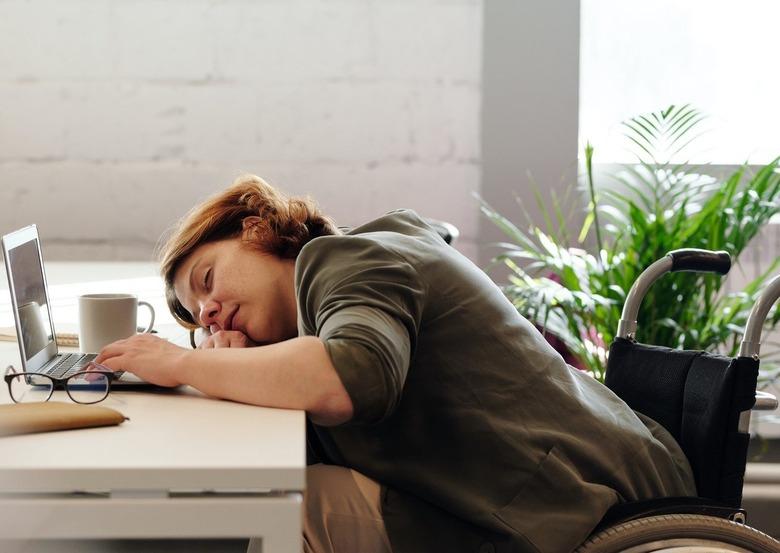How Your Relationship With Sleep Can Change When You Have A Disability
There is nothing quite like the gift that is a full night of quality sleep. It is truly one of my favorite things. But, what happens when sleep isn't a guarantee? I'm not talking about the occasional night of tossing and turning. I'm referring to when your body fights its own natural inclination to sleep.
When you are disabled, struggling with sleep isn't a foreign reality. The University of Washington reports that 40% of disabled adults come up against long-term sleep problems. The reasons for this can vary, from disability specific causes like chronic pain to non-disability sources like too much caffeine, alcohol, or napping during the day.
In my experience, as someone who has spastic cerebral palsy, I like to think that having a disability means you have a naturally unruly body, and the easiest way for me to calm that body is by sleeping. Yet, when I entered my twenties and started attending college, I was diagnosed with major depressive disorder. The inability to sleep is a symptom of the latter that can become cyclical, and it is unfortunately something I began to experience. Suddenly, sleep was no longer a way for me to derive peace.
According to research conducted by Johns Hopkins, people with insomnia have a higher risk of developing depression than those who can easily hit the hay. One of these issues, insomnia or depression, can be a starting point for problems with the other. Depression, specifically, is classified as a mood disorder by the National Institute of Mental Health, and if a person can become crabby after one night of poor rest, then one can see how chronic nights of difficult sleep could result in a bad mood becoming something more serious.
The National Institute of Neurological Disorders and Stroke states that though we know sleep is important to the body, the exact biological purpose isn't well understood. Yet, sleep is a tremendous job for our brains to accomplish and it is known that a chronic lack of sleep can increase the risk for cardiovascular disease, high blood pressure, and diabetes, which can complicate any disability one already deals with — physically or mentally.
A 2019 study in The Journal of Intellectual Disability Research found that 32% of participants with an intellectual disability struggle with multiple kinds of sleep disturbances. Previous studies have also concluded that individuals with intellectual and developmental disabilities — such as Down syndrome, autism spectrum disorder, Smith-Magenis syndrome, and more — have an increased likelihood of dealing with sleep difficulties like insomnia, disordered breathing, and excessive daytime sleepiness (EDS).
For those with physical disabilities, one might assume that sleep can easily be achieved by simply making oneself comfortable. That is not the case. Because of my spastic cerebral palsy and recent medical issues, I've landed in the emergency room a few times and find that sleeping there (I often go at night) is nearly impossible. That could be due to factors like bright lights and other people being around me, but I discovered that my body only works the way I need it to when presented with certain conditions involving the surfaces I lay on and the environment I'm in.
Anyone who's spent time in a hospital bed can tell you that they are uncomfortable, but in my experience, it can be made even more intolerable when you have a disability like spastic cerebral palsy. I can't completely straighten my legs in a hospital bed like I can on my regular mattress and my muscles won't relax enough, so I spend most of the night with bent, sore knees, jolting awake as I try to fall asleep while my legs tighten. As you can imagine, this is painful and does not make for a good night's sleep. Since my muscles can't relax, my tone (the amount of tension a muscle has at rest) kicks in and my heels dig into the plastic-like material that hospital beds are made of. It hurts for hours on end and because I'm lying in a stiff bed, it's harder to move in search of comfort.
By the time I'm discharged from the hospital and ready to head home, I feel so exhausted from being wired and in pain. Sleep is also restorative when I cope with chronic pain, so not being able to have it can feel like torture. After leaving the ER, I often sleep for at least 10 hours and my record for staying awake, including a hospital visit, is around 33 hours.
So, what can you do as a disabled person if you have issues sleeping? Of course, I can only speak on what works for me. After years of taking over-the-counter sleep medication, I wanted to try something different and discovered a few elements that make all the difference:
- I can only sleep on mattresses that are of average firmness with the standard amount of "give," since it makes it easier for me to move.
- It has to be as pitch black as possible — no light can be near my line of sight.
- Painkillers must be in reach, in case chronic pain strikes.
- I need sound — fans, white noise, podcasts — to lull me into sleep. A combo of two kinds of sounds, one further away or in the room versus one near me (under the pillow). For example, a fan and a podcast.
If sleep is a process our bodies cannot function without, then it's important to recognize how rest can affect those with bodies that are different. This consideration can be applied to everything from the sleep products we create to the ways in which we discuss sleep.
Ultimately, for those with disabilities, sleep can mean getting ahold of a body that doesn't always do what you want.
